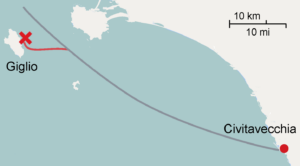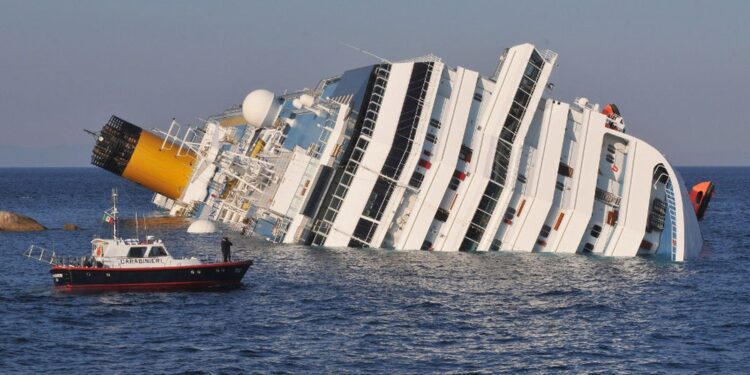Six years are marking today since the fatal grounding of Costa Concordia cruise ship in the Mediterranean Sea, resulting in 32 deaths, 64 serious injuries, and a ship total loss. The casualty remains a classic example of how human error, lack of alertness and failure of compliance with procedures can lead to maritime disasters.
On the night of 13 January 2012, during a seven-day cruise, Costa Concordia with 4,229 people onboard, was sailing from Civitavecchia, Italy, to Savona, when she deviated from her planned route at the Isola del Giglio. About half an hour after deviation, on 21:45, the ship struck her port side on a reef, known as the the “Scole Rocks”, about 800 metres south of the entrance to the harbour of port of Giglio, on the island’s east coast.
A long damaged on the hull caused water ingress on the left-hand side, which made the ship to tilt. The engine rooms were flooded and propulsion was lost. Everyone on board realized that something serious was happening, because the ship violently decreased speed and a black-out occurred.
However, an alarm was not raised until 22:33. Port authorities were not alerted to the collision until 22:42, about an hour after the impact, and the order to evacuate the ship was not given until 22:50. After grounding, passengers and crew were taken ashore from the ship by lifeboats and helicopters or swam to the island. The Captain reportedly abandoned the ship before the evacuation was completed.
The ‘Costa Concordia disaster’ is often associated with Titanic in public view. However, Costa Concordia was carrying over 4,200 people, not counting in the stowaways, the presence of whom has been confirmed later, which means the number of passengers was more than double compared to Titanic. Most of them were evacuated over a period of less than two hours, mostly by lifeboats and in few cases by swimming ashore.
Probable Cause
Incident investigation revealed the ship was sailing too close to the coastline, in a poorly lit shore area, under the Master’s command who had planned to pass at an unsafe distance at night time and at high speed (15.5 kts). The danger was considered so late that the attempt to avoid the grounding was useless, according to Italian Ministry of Infrastructure and Transport’s report. As it was found later, Captain Francesco Schettino ordered the ship to sail unacceptably close to the coast of Giglio as a “salute”.
CNN’s Tom Foreman explains how the Italian cruise ship Costa Concordia went down:
Fatalities
33 people died as a result from the accident, including 32 passengers and crew and one salvage member. Between 14 and 30 January 2012, rescue divers searched within the ship for missing people and recovered most of the bodies. However, the last body was not recovered until November 2014.
Sentences
In May 2017, the Italian highest court upheld the sentence of the former Costa Concordia captain to 16 years in prison. Francesco Schettino has been convicted of manslaughter and causing the shipwreck, as well as of abandoning the capsizing vessel with passengers and crew still aboard. The Captain admitted responsibility of poor judgement, saying he had “ordered the turn too late”, but he denied that was the one to blame for the deaths. Earlier, five crew were also convicted of multiple manslaughter and causing personal injury.
Salvage
The ship was left abandoned on its side for two-and-a-half years before it was refloated and towed to Genoa in July 2014. By January 2017, most of Costa Concordia had been dismantled and scrapped in Genoa, with all metal being recycled where possible, while final scrapping was completed in July 2017. The Costa Concordia wreck recovery was one of the most expensive ones in history (about USD 2 billion), as it costed more than three times the vessel’s building cost, back in 2004 (about USD 612 million).
Lessons Learned
Notwithstanding that human element was at the root of the loss of the Costa Concordia, special importance was given on the aftermath of the accident to evacuation procedures, as investigation showed that opportunities to abandon ship before it started listing were wasted. Delay in the evacuation remains an aspect of this disaster particularly surprising.
As a result, immediately after the incident, CLIA proposed lifeboat drills to be mandatory prior to vessel departure, and not within 24 hours after departure, and the IMO made the rule mandatory as from January 2015.
Secondly, the incident highlighted the common practice of large cruise liners, sailing unacceptably close to the coast. Within the same year of the grounding, CLIA set mandatory policies regarding the passage planning and the bridge access, while several cruise companies, including Costa Cruises, became stricter implementing real-time monitoring ship technologies to ensure vessels follow their planned routes.
Further, the immediate flooding of five contiguous watertight compartments, where most of the vital equipment of the ship was located, made the Costa Concordia casualty quite a unique event, because of the extent of damage is well beyond the survivability standard applicable to the ship according to her keel laying date.
Inspired by the accident, EMSA conducted a damage stability study focusing on passenger ships, which completed in 2016. IMO’s MSC in June 2017 adopted amendments to SOLAS 2020 that raise the ‘required index R’, damage stability requirement, representing the ship’s capability to remain stable and afloat in the event of flooding after a collision.[/two_third_last]
Watch herebelow a time-lapse of the vessel’s removal:
LEARN FROM THE PAST: Read in this series












































































































There is a more detailed and better explanation in the book “Bridge Resource Management – From the Costa Concordia to Navigation inthe Digital Age” by Captain Antonio Di Lieto.